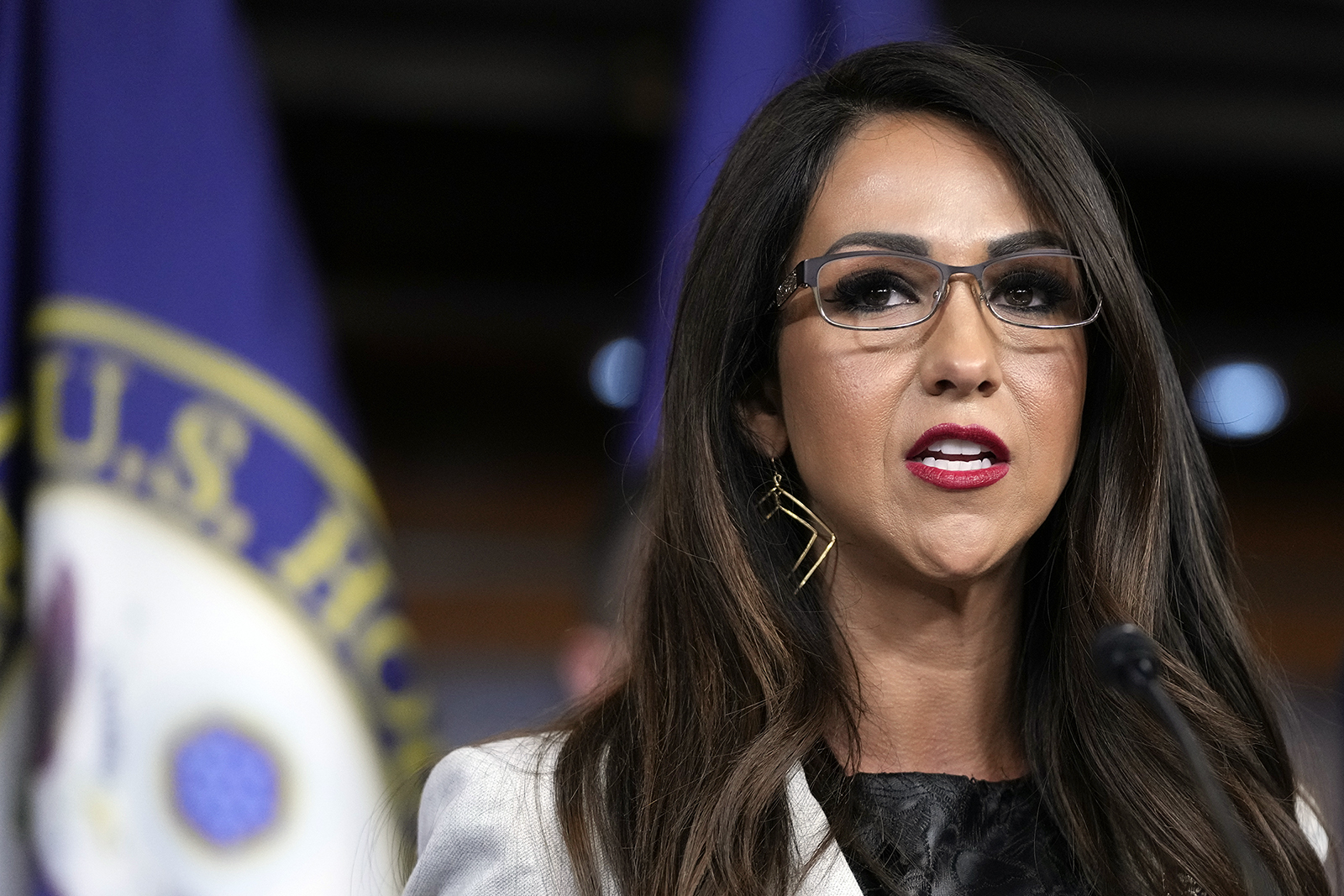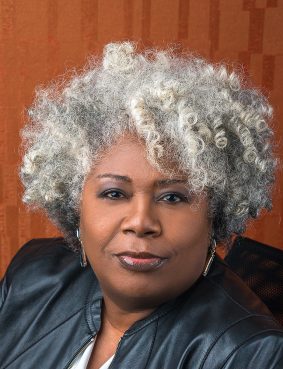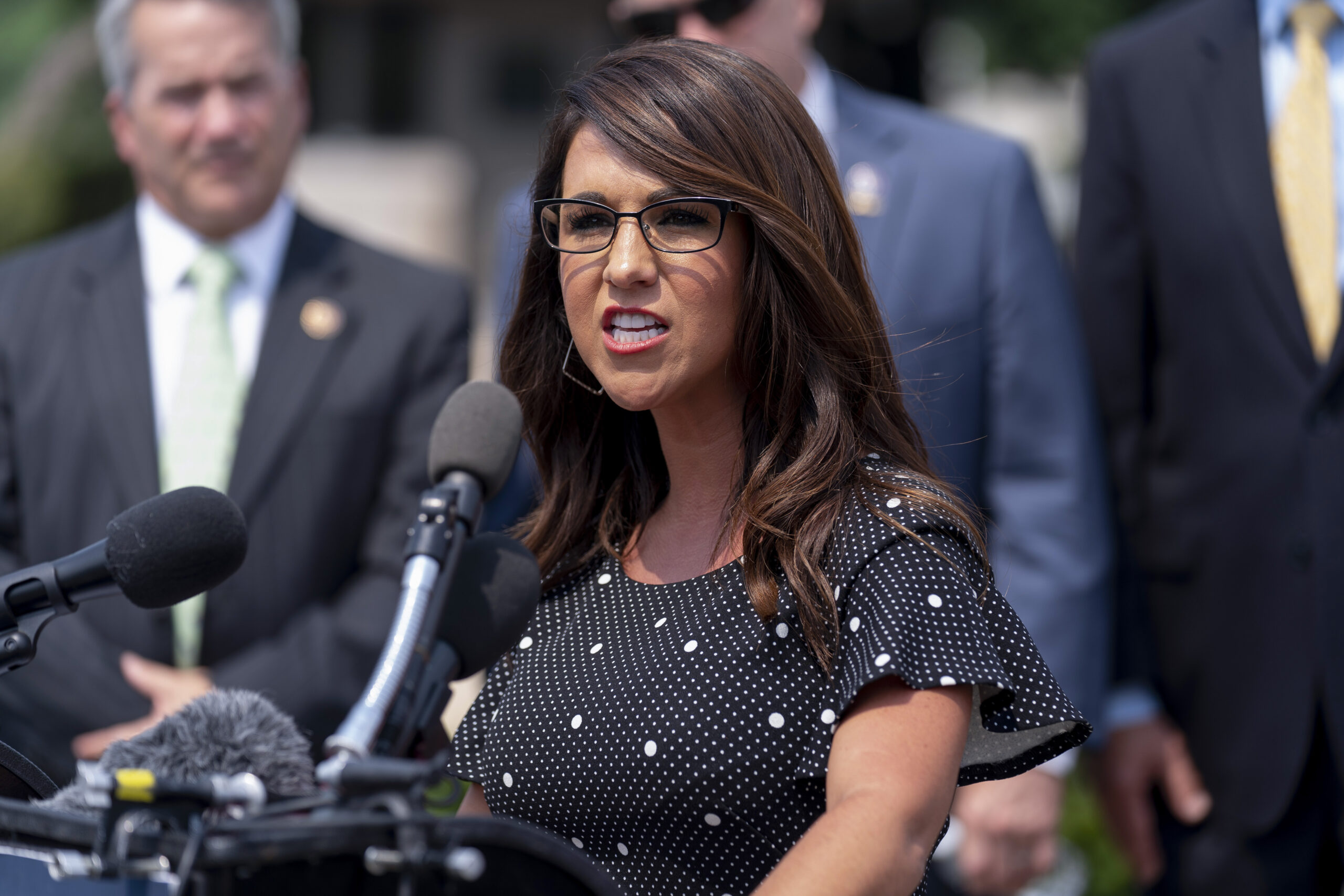WASHINGTON (RNS) — At last summer’s “Family Camp Meeting,” convened at Charis Christian Center in Colorado Springs, Colorado, the church’s pastor, Lawson Perdue, opened one of the sessions by playing a campaign video featuring Rep. Lauren Boebert driving in a demolition derby. Then Boebert took the stage herself, launching into a nearly hour-long speech that cited Scripture and laced her right-wing political message with religious rhetoric.
“I want to let y’all know, right now is the time for the church to influence the nation,” the Colorado congresswoman said, sparking applause. “This is the vision that our Founding Fathers had from the beginning.”
After she finished, Perdue took the microphone and encouraged the crowd to donate to Boebert’s cause — specifically, her reelection campaign.
“We cannot, as a church, legally give her an offering, but I’m going to tell you how you can give to Lauren,” Perdue said, making sure to recite the URL for Boebert’s website and project it onto the screen.
“I’d like at least 50 people in this room to join me by donating $100 — I’d like to give her at least $5,000 from Charis Christian Center today,” he added, noting he planned to donate himself. “Do it today, so she knows it came from us.”

Rep. Lauren Boebert, R-Colo., a member of the House Freedom Caucus, speaks during a news conference on Capitol Hill in Washington, Friday, July 14, 2023. (AP Photo/Patrick Semansky)
Mixtures of faith, politicking and even fundraising have become common for Boebert and other political figures, particularly Rep. Marjorie Taylor Greene, both of whom have linked right-wing political personas to conservative Christian movements and leaders. Spurred by polarized politics, forms of conservative Christian faith and overt appeals to Christian nationalism are increasingly used to bolster political and financial support for GOP candidates — sometimes in ways that may run afoul of federal tax law.
Sam Brunson, law professor at Loyola University Chicago and author of “God and the IRS: Accommodating Religious Practice in United States Tax Law,” said the solicitation at Charis Christian Center may violate federal tax law. The IRS website notes nonprofits could lose their tax-exempt status if they endorse candidates or engage in campaign fundraising, declaring they are “absolutely prohibited from directly or indirectly participating in, or intervening in, any political campaign on behalf of (or in opposition to) any candidate for elective public office.”

Sam Brunson. Photo courtesy Loyola University Chicago
“It is clearly a problem under the Johnson Amendment,” Brunson said, referring to the common name for the specific prohibition in the tax code. “It clearly violates the rules under 501(c)(3).”
Whether breaking those rules will mean anything is another matter. Brunson pointed to a recent investigation by ProPublica and the Texas Tribune that tracked similar practices at a politically diverse range of churches from across the country. The IRS is known to avoid enforcing the Johnson Amendment, he said, and churches highlighted by the ProPublica/Texas Tribune investigation have generally faced few, if any, legal repercussions.
Neither Charis Christian Center nor Boebert’s office responded to questions about last summer’s solicitation.
Boebert, like many politicians on either side of the aisle, speaks at churches regularly, and Religion News Service did not find examples of her soliciting funds directly from the pulpit. Her speeches during church services often appeal to a broader message, or occur in sanctuaries that are hosting larger political events.
But the line between political rally and church service has blurred in some conservative Christian spaces, particularly those that give voice to forms of Christian nationalism. Perdue wasn’t even the first faith leader to make a funding pitch on Boebert’s behalf: In 2021, Boebert also spoke at the Truth and Liberty Conference, hosted at Charis Bible College, where she attracted media attention for calling on the Almighty to install “righteous men and women of God” to run the government. Evangelist Andrew Wommack, who oversees the political group that organized the conference, stood next to her and encouraged an estimated 1,000 attendees to give $20 to her cause each.
Boebert has also invoked faith at traditional fundraising events. While speaking at a fundraiser in Tennessee, she told attendees they were in the “last days” and congratulated the crowd for being “part of ushering in the second coming of Jesus.”
So, too, has been the case with Greene. Although a rival of Boebert’s — the two reportedly have feuded behind closed doors for years and recently exchanged harsh words in public — they both have appeared at some of the same religious events. Greene famously made headlines last year when she began identifying as a Christian nationalist and suggesting the GOP become “the party of Christian nationalism.”

Rep. Marjorie Taylor Greene, R-Ga., speaks to supporters ahead of a campaign rally by former President Donald Trump, Saturday, July 1, 2023, in Pickens, S.C. (AP Photo/Chris Carlson)
As attention to Greene’s new political identifier grew last July, she began selling $30 T-shirts with the slogan “Proud Christian Nationalist.” They remain prominently available for sale on her website, with proceeds going directly to her People over Politicians joint fundraising committee.
Anthea Butler, a University of Pennsylvania religion scholar and author of “White Evangelical Racism,” noted that Republican appeals to conservative forms of faith are hardly new. Even in the contemporary era, the kind of message Boebert delivers on the stump — or, especially, from the pulpit — has ample precedent.
“To me, it’s a cross between Sarah Palin and Paula White,” she said, referring to the 2008 GOP vice presidential candidate and former President Donald Trump’s closest religious adviser, respectively.

Anthea Butler. Courtesy photo
But today’s politics are more polarized, attracting a greater number of religious voices who unapologetically embrace right-wing rhetoric. Regardless of whether they open up funding streams, some Republicans see political benefits to being in their orbit.
Butler pointed to Boebert’s close connection with Sean Feucht, a musician and activist who garnered a national following in recent years for hosting a string of concerts to protest COVID-19 restrictions on churches during the height of the pandemic.
“I wonder, with this relationship with Feucht, if (Boebert) feels like he can bring her somewhere else, because he’s got all these connections,” Butler said.
Indeed, Boebert has appeared alongside Feucht multiple times over the past year. She spoke at his Hold the Line conference hosted at a Colorado church last May, delivered a speech during Feucht’s protest rally outside the Supreme Court last summer (which Boebert’s staff later cut into promotional video), was a guest on his podcast and invited him to lead worship at her 2022 campaign victory party.
Feucht, himself a former congressional candidate in California, has shown affinity for other conservative lawmakers as well. Shortly before the 2022 midterm elections, he hosted a Let Us Worship event on the National Mall, where Missouri Sen. Josh Hawley — who recently was accused of advocating for Christian nationalism — was brought onstage. After Hawley finished speaking, Feucht read Scripture to assuage those in the crowd who were concerned about Christian nationalism, then prayed for God to “raise up men and women just like Josh to run for office,” adding, “we promise to pledge our support behind them.”
More recently, Boebert has forged connections between Feucht and other lawmakers. In March, when Boebert helped facilitate an evening worship service led by Feucht in the rotunda of the U.S. Capitol, the crowd of 20-30 people included several Republican members of Congress, such as Reps. Tim Burchett of Tennessee and Tracey Mann of Kansas. After the event — which was livestreamed by Feucht’s team — the group posed with Feucht for photos.

Rep. Lauren Boebert (R-Co), center, raises her arms during a worship service led by musician Sean Feucht, right, in the rotunda of the U.S. Capitol, March 9, 2023, in Washington. RNS photo by Jack Jenkins
Still, Boebert has sought to distance herself from the term Christian nationalism. Speaking to RNS immediately after the worship service in the Capitol rotunda, Boebert described the event as expressive of “God, family, (and) country,” but switched gears when asked about Christian nationalism.
“I don’t need a qualifier for my faith, and I don’t think that Sean does either,” she said, referring to Feucht.
Feucht did, in fact, embrace the term Christian nationalism only a few weeks later. While discussing the phrase, he told a crowd gathered at an Oklahoma church that critics who use it are correct when they say he and others “want believers to be the ones writing the laws.”
But experts who spoke to RNS said Boebert’s discomfort with the phrase may be the result of simple politics. She may have reservations about using a term popularized by Greene, for instance, especially after the Georgia congresswoman spoke at an event last year organized by the far-right group America First, which is led by ardent Christian nationalist and white nationalist Nick Fuentes. (Greene later distanced herself from Fuentes.)
Or it may have to do with her reelection prospects. Despite drumming up support among conservative Christians and redistricting that only strengthened Republican power in her district, Boebert won her 2022 reelection bid by a mere 546 votes. Adam Frisch, the Democrat who almost beat her, is running again and has raised $2.6 million from April through June — more than triple Boebert’s own haul of $818,000 during that same period.

FILE – Rep. Lauren Boebert, R-Colo., speaks at a news conference held by members of the House Freedom Caucus on Capitol Hill in Washington, on July 29, 2021. (AP Photo/Andrew Harnik, File)
Greene, meanwhile, resides in a deeply red Georgia district and pulled in $1.1 million in donations from April to June, according to the Atlanta Journal-Constitution. That makes her one of the top fundraisers in the House despite being kicked out of the House Freedom Caucus early this month. (In 2022, she pulled in $12.6 million over the entire year, according to The Washington Post.)
Neither Greene nor Boebert fundraise or campaign solely by appealing to religion, of course. But Butler argued Boebert’s tough reelection fight may lead her to seek connections with evangelicals who aren’t comfortable with some elements of Christian nationalism, whereas Greene and her supporters “want to lean into it.”
When RNS reached out to Boebert’s office to inquire about her thoughts on the ideology, a spokesperson repeatedly suggested a conversation with Mark Hall, a professor of religion and politics at Regent University. Hall has been critical of Christian nationalism and its adherents but also downplayed its potential dangers, often accusing fellow academics who research the phenomenon of making overwrought claims.
Hall told RNS he hasn’t spoken to Boebert personally but contacted her office to confirm she doesn’t self-identify as a Christian nationalist. A Boebert spokesperson, Hall said, told him the congresswoman avoids the term in part due to its affiliation with far-right figures such as Stephen Wolfe, author of “The Case for Christian Nationalism.” Wolfe, Hall noted, has suggested the right to vote should be largely restricted to married men.
“That’s exactly why she doesn’t want to identify as a Christian nationalist,” Hall said of Boebert, citing his conversation with her press team.
But Hall and others agreed that political engagement with Christian nationalism, be it rhetorical or financial, may come down to practical concerns.
“We’ve seen over the last 20 years, because of gerrymandering and the ability of people to move to different states, the development of these incredibly, deeply red congressional districts — and on the flip side, deeply blue congressional districts,” Hall said. “If you’re a member of one of these districts, your primary threat is being primaried, so you’re incentivized to engage in sort of absolutist rhetoric.”
(This story was was reported with support from the Stiefel Freethought Foundation.)





